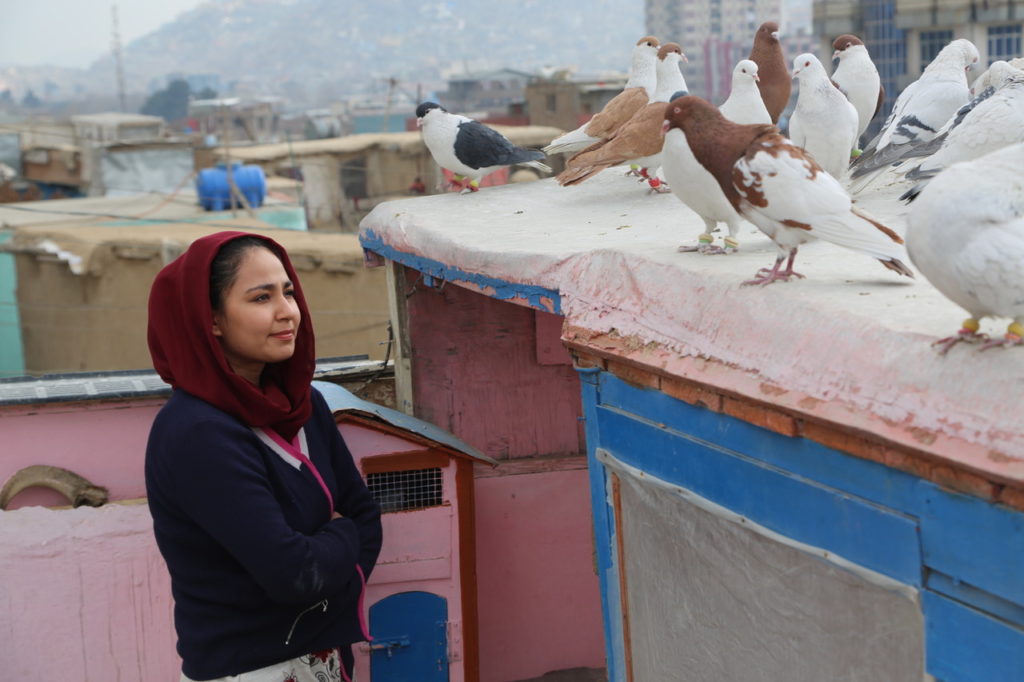Sahraa Karimi comes from the second generation of Afghan refugees in Iran. At the age of 15, she acted in two Iranian films, which led to her studying cinema in Slovakia. She graduated with a PhD in directing. Karimi has made more than 30 shorts. Two of her documentaries were broadcast through ARTE France and BBC. “Hava, Maryam, Ayesha” is her first feature.
“Hava, Maryam, Ayesha” will premiere at the 2019 Mill Valley Film Festival on October 6.
W&H: Describe the film for us in your own words.
SK: It is about the women of Afghanistan who are voiceless. The film goes beyond the clichéd ways the world views Afghan women.
W&H: What drew you to this story?
SK: I am a woman from Afghanistan. I live here and see the everyday lives of Afghan women. I had a chance to travel to many remote villages inside Afghanistan, and I listened to many stories. I understood that it doesn’t matter whether you are from a remote village or big a city — we live in a country where the majority of people do not believe in any kind of women’s rights, where the society is strongly anti-women, and where the patriarchal society and its traditions limit women for different reasons.
As an Afghan woman who has to tell stories, I have to make films about women whose worlds I know better. The media shared their stories about Afghan women for many years and the world thinks they know us, but they don’t. Because our real stories are hidden far beyond the media clichés and political issues, I wanted to show our real world.
W&H: What do you want people to think about when they are leaving the theater?
SK: I would like them to leave the theater realizing that Afghan women are like other women in the world. They have similar problems, issues, and struggles. I want audiences to know that these women are fighting and won’t give up easily.
W&H: What was the biggest challenge in making the film?
SK: It is a very independent film so we had budget issues, but the main issue was security. During 40 days of shooting there were five major explosions in Kabul, but we didn’t want to stop the shooting.
W&H: How did you get your film funded? Share some insights into how you got the film made.
SK: It is an independent and low budget film. I sent the script to many major film funds, and they all passed on the project. The script was not the issue — I don’t think they believed that we could shoot this kind of film inside Kabul.
I decided to send the script to well-known Iranian producer Katayoon Shahabi, hoping that she would produce the film. She gave her notes after reading the script, but she wasn’t convinced we could shoot this film inside Kabul. I decided to shoot it with my own money and took a job at UNICEF for two years. My family helped me too.
When we finished production, I sent the rough cut to Katayoon again and she liked the film and financed the post-production.
It is a very independent film without the support of any studios, film funds, or crowdsourcing.
W&H: What inspired you to become a filmmaker?
SK: I studied mathematics and physics and wanted to become an architect, but at 14 I got cast in “Daughters of the Sun,” an Iranian film by Maryam Shahriar. That changed my life. Suddenly I discovered a new world where you are very free to create.
My mom was a great storyteller and I spent much time as a child listening to her and her stories. I decided to become a storyteller too, but not as a writer — as a filmmaker. Then, at 17, I got the opportunity to go to Europe and went to a film school to become a director.
W&H: What’s the best and worst advice you’ve received?
SK: The best advice was from my stepmother: Listen to everybody but follow your heart.
And the worst was that from some people, and specifically film funds, that you cannot shoot a movie inside Afghanistan.
W&H: What advice do you have for other female directors?
SK: It is not an easy profession, but it is amazing. Making films and telling different stories is so extraordinary that it is worth overcoming the difficulties to be a film director.
W&H: Name your favorite woman-directed film and why.
SK: Chantal Akerman and Lucrecia Martel are my favorite women directors. I like how they picture the world and how they are so perfect in their way of storytelling and filmmaking. They use the language of film very artistically to describe life and its meaning.
Akerman’s films are somehow a manifesto about femininity. Martel’s films are true studies of human beings’ inner lives. I think both filmmakers’ works are about showing and telling stories of human beings [existing] in the chaotic world.
W&H: What differences have you noticed in the industry since the #MeToo and #TimesUp movements launched?
SK: I think the differences are obvious. You can clearly see — everywhere [you look] — that something important and significant is happening and is growing concerning gender equality and women’s role in society. It is becoming harder and harder to ignore the importance of the role of women. These movements helped the voiceless women to speak and to speak louder and louder — to no longer be afraid to have an opinion and voice.
Breaking the silence gave us the courage to tell more and more original stories, reflecting the reality about women’s lives all around the world.







